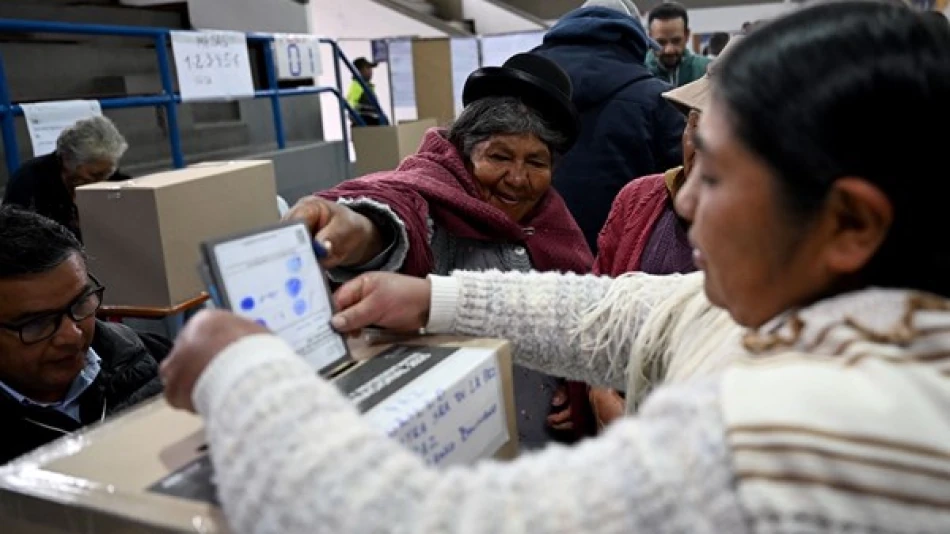
Bolivia Elects President and Parliament, Anticipating the Return of the Right to Power
Bolivia's Historic Right Turn: Voters Poised to End Two Decades of Socialist Rule
Bolivians are voting in a watershed election that could mark the end of nearly 20 years of leftist governance, with polls showing strong support for center-right candidates promising to dismantle the state-dominated economic model and restore ties with the United States. The election represents a dramatic shift from the socialist policies that once made Bolivia a regional outlier under indigenous leader Evo Morales.
The Frontrunners Promise Economic Revolution
Businessman Samuel Doria Medina and former president Jorge "Tuto" Quiroga lead the race, each polling around 20% in what appears to be a tight contest heading toward a likely runoff on October 19th. Both candidates have pledged sweeping changes to Bolivia's economic framework, promising to reduce public spending, attract foreign investment, and pivot away from the anti-capitalist stance that defined the Morales era.
The shift in voter sentiment is striking. Marcela Serpa, a 63-year-old indigenous vendor who traditionally supported the ruling Movement for Socialism (MAS), now backs Quiroga. "The Movement for Socialism has left us all at rock bottom," she said at a campaign rally in La Paz, reflecting broader frustration with the current government's economic management.
From Boom to Bust: Bolivia's Economic Reality Check
The potential political transformation stems from Bolivia's dramatic economic decline. Under Morales, the country experienced over a decade of robust growth fueled by nationalized gas revenues that peaked at $6.1 billion in 2013. These funds financed ambitious social programs that cut extreme poverty in half and elevated the status of indigenous populations.
However, limited investment in exploration has caused gas revenues to plummet to just $1.6 billion last year—a 74% decline from the peak. This collapse has exposed the vulnerabilities of Bolivia's state-centric model and created the economic conditions driving voters toward market-oriented alternatives.
The Candidates' Contrasting Approaches
Doria Medina, a cement industry millionaire and former planning minister, positions himself as a moderate reformer. His campaign promises to halt inflation and restore fuel and dollar availability within 100 days while maintaining anti-poverty programs—a delicate balance aimed at reassuring voters wary of dramatic social cuts.
Quiroga, a U.S.-trained engineer who briefly served as president in 2001, takes a more aggressive stance. "We will change everything, absolutely everything after 20 lost years," he declared in his final campaign appearance, signaling a more comprehensive break with current policies.
Regional Implications and International Realignment
Bolivia's potential rightward shift would align with broader regional trends, following similar political transitions in Argentina, Chile, and Ecuador. The candidates' promise to strengthen U.S. relations marks a significant departure from Morales's anti-imperialist rhetoric and could reshape South American geopolitics.
For international investors, particularly in the energy sector, the election outcome could signal new opportunities in a country that has been largely closed to foreign capital for two decades. However, the success of any new government will depend on its ability to revive gas production while managing social expectations shaped by years of generous state spending.
The End of an Era
This election effectively closes the book on one of Latin America's most distinctive political experiments. The MAS party's dominance since 2005 represented a unique blend of indigenous rights, resource nationalism, and socialist economics that briefly made Bolivia a symbol of anti-neoliberal resistance.
The apparent voter rejection of this model reflects not ideological conversion but economic pragmatism. As gas revenues dried up and shortages mounted, Bolivians appear ready to trade revolutionary rhetoric for practical governance—a shift that could redefine the country's trajectory for the next generation.
Most Viewed News

 Layla Al Mansoori
Layla Al Mansoori






